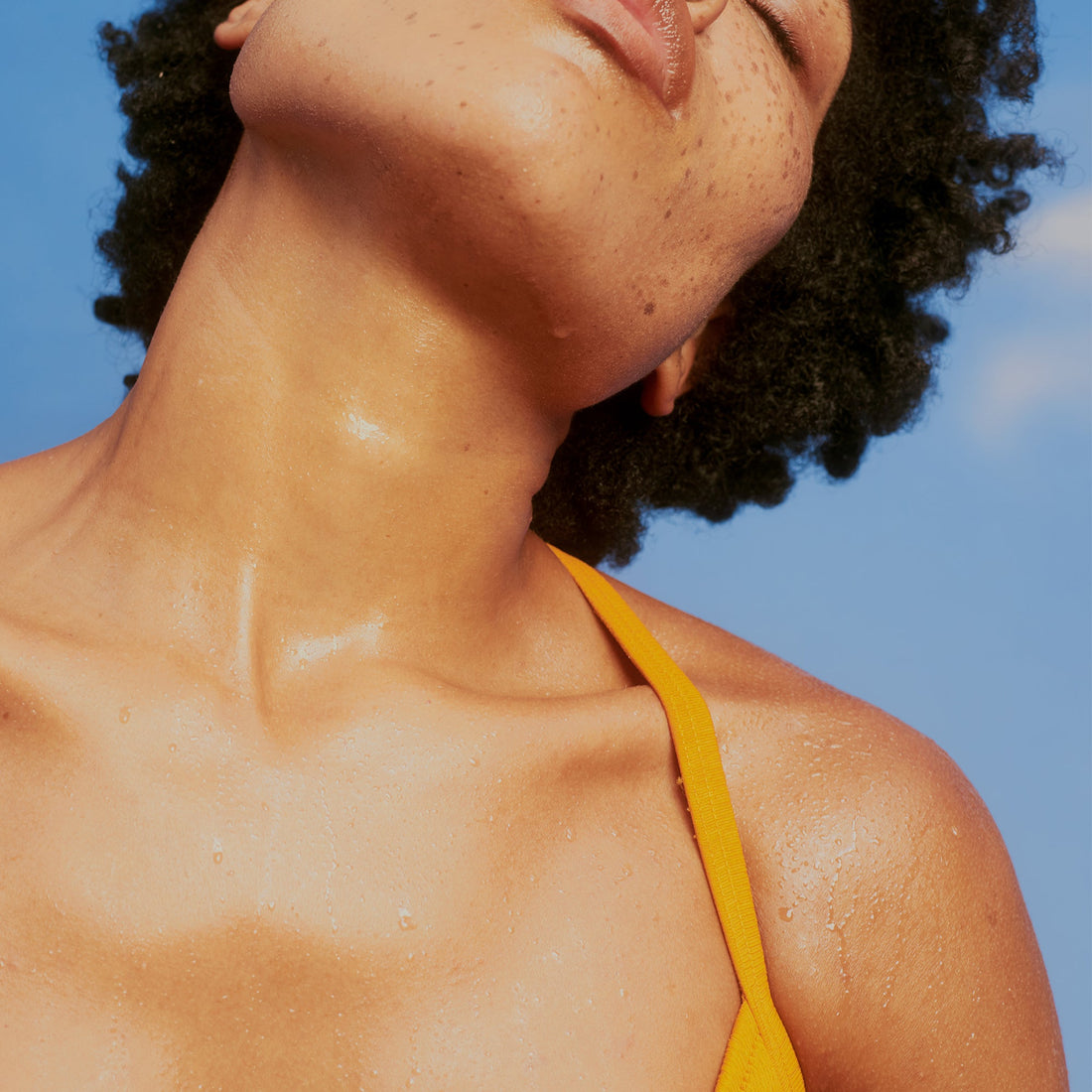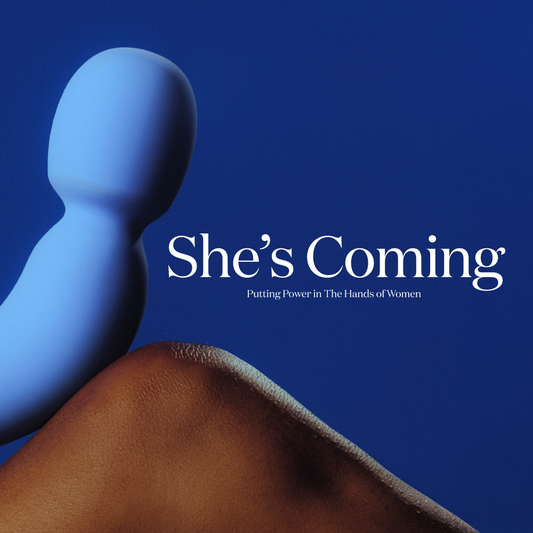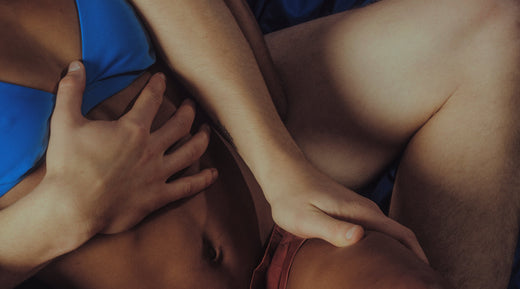TL;DR
- Bisexual erasure is when we overlook, ignore, and perpetuate negative stereotypes about people who are attracted to more than one gender.
- Bi erasure can intertwine with racism, ableism, transphobia, and other forms of marginalization.
- Combat bi erasure by practicing self-love and building healthy boundaries.
When Charmee Taylor, an LA-based actor, came out as bisexual two years ago, she hoped it would be a climactic moment. “A band is going to play, people are going to be like ‘Go Charmee, you’re out!’” she says. But the euphoria was tempered by a sinking realization: As a Black bi woman, Taylor would be coming out, in one way or another, for the rest of her life. That’s partly due to bisexual erasure, the tendency of both straight and queer communities to overlook, ignore, and perpetuate negative stereotypes about people who are attracted to more than one gender. Bisexual erasure intertwines with racism, ableism, transphobia, and other forms of marginalization to harm bi folks in all our intersecting identities. Like the bi folks I spoke to for this piece, I define “bisexual” as meaning attraction to more than one gender, which can include people across the gender spectrum. Bisexual people can be cis, trans, or agender; we can identify as fluid or find that our attractions are more fixed; and we can be attracted to different genders, at different times, to different degrees. “Bisexual” and “pansexual” are different labels for people attracted to multiple genders, and there are many reasons folks prefer one or the other, but we share similar concerns and solidarity. Bisexuals are the largest subgroup of LGBTQ-identified people. Yet most of us have, at one point or another, had to contend with the myth that we don’t exist. Bi erasure is rooted in the misunderstanding of gender and sexuality as a binary, in which we must be either men or women, gay or straight. Partly as a result of bi erasure, bisexual folks are less likely than our gay and lesbian siblings to come out; we have limited data and funding dedicated to our health; and we experience increased rates of poverty and violence. While bi erasure is harmful and persistent, Deana Williams, a sexual health doctoral candidate and researcher at Indiana University, reminds us that it’s not the whole story. Bi folks have long pushed back against a world that overlooks us, turning our sexuality into a source of solidarity. “We can use identity for resilience,” she says.
Bi Erasure Is Constant
Most bi folks have a story of coming out and feeling invalidated. This can take the form of being told “you’re just asking for attention,” says Marissa Tolero, a bi-identified psychotherapist and yoga instructor who works with women and queer clients. When Taylor came out to some loved ones, meanwhile, she was asked whether she was bi as a result of childhood trauma, and whether bisexual men really exist. (“That’s like being like, ‘Is the sky real?’ Yes, it’s real,” she says.)
Discrimination of bisexual people is ultimately harmful to all queer people.
Many bi people face the assumption that our sexualities are temporary. “People assume bisexual women are just experimenting, and they’ll ultimately realize that they’re straight. And bisexual men are on the triain to being gay,” says Nic Johnson, a Lehigh University professor who researches bi women’s experiences of sexual violence. Of course, bi folks’ attractions can be fluid, and our labels can change—but that’s not proof that our sexualities aren’t “real.” Similarly, bi folks are often judged according to the gender of their current partner, rather than their self-identified orientation. “A lot of people assume that once you’re married, you’ve ‘picked a side’,” says Cora Eckert, a bi, nonbinary woman theater professional who moderates a Facebook group for bi people with long-term partners. (They use all pronouns, but opted for they/them pronouns for this piece.) “I’ve had to tell them that even though I’m married to my wife, that doesn’t make me a lesbian,” they say. Tolero experiences the opposite pressure: Because she’s in a relationship with a cisgender, heterosexual man, others often assume that she’s straight. Queer people perpetuate anti-bi stigma, too. Tolero has been told by queer friends that, because of her relationship, she’s “chosen men” and is less queer. As a result of similar kinds of invalidation, Johnson says, “I feel more accepted in queer spaces if I don’t say that I’m bi.” This discrimination is ultimately harmful to all queer people. It increases our collective anxiety around identity, and decreases our ability to build community. The result, says Tolero, is a “divide and conquer” dynamic that ultimately benefits cis men. “Those who are oppressed are encouraged to divide and turn towards each other,” says Tolero. “It’s a tactic of oppressing queer people in general.”
Bi Erasure Hurts Our Health
Bi erasure enables harmful stereotypes and prevents accurate, empowering research on the bi community. Bisexual people experience higher rates of poverty than lesbian and gay people, at 30 percent. We’re also more likely to experience interpersonal violence: 61 percent of bisexual women, and 37 percent of bisexual men, have experienced sexual or intimate partner violence, as compared to 44 percent of lesbians and 26 percent of gay men. There isn’t good data on how biphobia specifically effects trans and nonbinary people, but in general, 31 percent of trans people live in poverty, and 66 percent have experienced sexual violence—a much higher rate than their cisgender counterparts.
“You don’t have to change yourself to please anyone. Embrace all of yourself.”
Mainstream culture hypersexualizes bi people, especially bi women and femmes, so our coming out may also be treated as a sexual invitation. That, says Johnson, can lead to others victimizing us. Eckert has felt this hypersexualization in their daily life. “For some reason when you say bisexual, people really emphasize the word sexual in it,” they say. Meanwhile, bi people of color are forced to navigate structural racism in addition to biphobia. For Taylor, this leads to a constant sense of in-betweenness. “I feel like I’m not accepted by the straight people back home,” says Taylor. But when she moved to a majority-white, gay Los Angeles neighborhood, “I felt that I couldn’t be Black.” These intersecting oppressions contribute to bi folks’ higher rates of anxiety, depression, and substance abuse.
Bi and Proud
“This is something I’m deeply struggling with as we speak—wanting to have someone be like, ‘Yes you’re queer,’” Taylor says. But true validation, she’s learned, can only come from within. “The only person that’s gonna bring you wholeness is yourself.” Wiliams, whose research focuses on the aging experiences of bisexual, bi- or multiracial people, has learned similar lessons from the elders she works with. “They reject being in a box and they love that,” Williams says. “That transcendence is something that is seen as a strength.” When Williams asks them for advice for younger bisexual, bi- or multiracial people, the lesson is often simple: “You don’t have to change yourself to please anyone. Embrace all of yourself.” This self-embrace is a daily practice, like a muscle we can build. We all have an inner voice that knows our truth, beyond the expectations of partners, family, or even LGBTQ community. Practice embracing this inner voice with compassionate understanding, says Tolero. Check in on your inner monologue: Are you making judgmental or invalidating comments toward yourself? See if you can reframe them into more affirming ones, giving yourself the same grace as you would a beloved friend. Seek out media that represents bi people in affirming ways; seeing positive reflections of ourselves can help change that internal script. You can also build healthier boundaries to protect your time and energy from people who invalidate you. Recently, Taylor says, she’s practiced opting out of conversations that deplete her emotional energy, especially when others ask her to educate them about her identities. “I have to take care of me first,” she says. “If you’re not there yet, I can’t bring you.” Many of the elders Williams works with feel that their identities as bisexual and bi- or multi-racial help them cultivate more empathic connections with other marginalized people. This kind of social support is one of the most important ways we can validate ourselves. Seek out bi-affirming community spaces. Try reaching out to your local LGBTQ community center or use the Bisexual Resource Center to find a bi-affirming group near you.
Building a Bi Utopia
Bi folks are taught that our orientation should be kept hidden. But in reality, our sexualities can be a source of joy and strength. I asked my interviewees what a bi utopia would look like for them. Eckert imagines a world in which “every human being has the right to explore who they are as a person.” Johnson wants a world where “your sexuality, whatever it looks like, could be seen as beautiful.” Taylor imagined a world of radical equality, in which the most marginalized are centered. We’ll reach a bi utopia, she says, “Once we get the people who are at the very back of the line to the front.” Enormous inequalities come between us and that world. But I believe that we each already carry a little piece of bi utopia inside us, in the form of our radical capacity to love. Taylor agrees. Even after reflecting on the pain of bi erasure, her voice fills with joy. “I feel overwhelmed with how happy I am to be bi. It’s such a gift,” she says. “In my opinion—I’m very biased, pun intended—I just think it’s a magical thing.”





















































